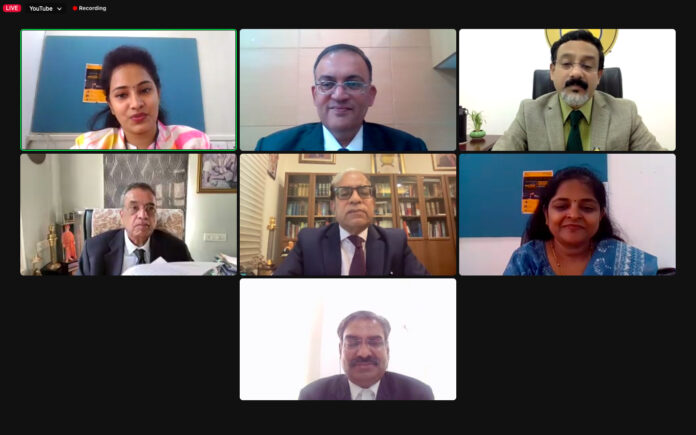Amity Law School, Mumbai, kickstarted the 3rd National Moot Court Competition. Former Supreme Court Judges, Justice Arjan Kumar Sikri and Justice M.R. Shah, were the chief guests for the inauguration of the competition. The inauguration ceremony took place online, with the presence of Prof. Dr. A.W. Santhosh Kumar, Vice-Chancellor of Amity University, Mumbai, and Dr. Vijay Singh Dahima, Deputy Pro Vice-Chancellor and In charge of Amity Law School. A total of 22 student teams will compete in this national-level moot court competition. The final round of the competition will be held on the campus. The Moot Court is a platform where future legal practitioners will showcase their advocacy skills, critical thinking, and legal acumen. More than 50 teams from across the nation have shown interest, but only 22 teams have successfully qualified for the competition.
During the opening ceremony, Professor Dr. A.W. Santosh Kumar highlighted how important moot court competitions are in helping students test their legal skills. He described law as an exciting field where lawyers work with complex rules and regulations while protecting basic human rights. Moot court contests give students a chance to show off their abilities and better grasp the legal world.
Justice Arjan Kumar Sikri stated that legal education and compassion encompass not only classroom study but also various other modes to develop the skills and shape students into good lawyers. To become a good lawyer, one needs three things: knowledge of law, writing and drafting skills, and impressive advocacy or oratory skills. Students acquire these skills through participating in moot court competitions, which will benefit them when practicing in actual courts. He further highlighted the unique feature of moot court competitions, where in one round, you argue for the petitioner, and in the next, you argue for the respondent. This requires being prepared for both sides of the case, an art that is challenging even for many experienced advocates..
According to Justice M.R. Shah, four “P’s” are necessary to be a successful lawyer: Preparedness, Presentation, Punctuality, and Politeness. He emphasized that legal education carries the weight of creating responsible citizens in a country, acting as a catalyst for delivering democratic ethos through social justice, political, and economic welfare. In the past, students primarily chose to join law schools due to a lack of admission to their preferred post-graduate disciplines. However, in recent years, due to the increased competition in legal education, it has become a more favored course for admission. If citizens receive a better legal education, it will ultimately strengthen the rule of law and bring discipline. Therefore, qualitative legal education is the need of the day.
Both chief guests boosted the students’ confidence and encouraged them to join litigation to gain a better understanding of real court proceedings. This experience will help them enhance their skills and become competent lawyers.
This year educate yourself and develop your career with EasyShiksha

































































